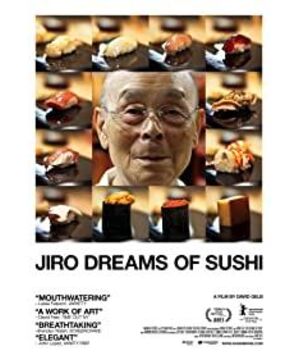is located in the basement of the Tokyo office building. Compared with the title of the film "The God of Sushi", it looks very simple and even a little shabby from the outside. A small shop with only ten seats behind Mu Shanlan, the 85-year-old Jiro Ono led a small number of apprentices to work in the shop. No menu, no drinks and side dishes, just sushi. The sushi menu depends on the season.
And such a small shop "Sukiyabashi Jiro" has won the highest crown of Michelin three-star restaurant for two consecutive years; it is necessary to reserve a seat one month in advance, a 15-minute meal, and the per capita consumption starts from 30,000 yen.
Facing the camera, 84-year-old Ono Jiro is thin and stubborn, with sharp eyes. He has a stern face. Whether it is an apprentice or a customer, more than one person said that they would feel stressed in front of him. Every day, he repeats the same work, and the seemingly simple sushi can be turned into magic in his hands, which is called minimalist delicacy.
The spirit of the craftsman The
bright red tuna is placed on the vinegared rice, and Jiro Ono prepares the sushi with a rigorous attitude and presents it to the customer. He observes customers very carefully and adjusts the size of sushi according to gender. He meticulously memorizes the seating order of guests, remembers their left-handed habits, and adjusts sushi placement preferences. He only cooks sushi from start to finish, without drinks, allowing customers to fully appreciate the beauty of sushi. During the production process, he seemed very calm and serious, and his gestures had a sense of ceremonial solemnity. Although the per capita consumption was US$400, the diners interviewed expressed their indescribable good feelings. This less than one and a half hour documentary records Jiro Ono's attitude towards his profession from an unpretentious perspective. The characteristics of great chefs are all similar: they are serious about improving their craft, stubborn, persistent, and ultimately passionate, and they are perfectionists. Ono Jiro emphasizes that he is a real craftsman - will find the best ingredients and handle them in his own way. Don't care about money and cost, just do your best. Ono said, repeating one thing to make it more refined, but never ending, "no one knows where the real peak is."
When preparing the daily sushi ingredients, Jiro Ono will personally go to the fish market to select all the details. It was not until a heart attack at the age of 70 that he finally stopped shopping in person, and acquiesced in the selection of fish market materials to his eldest son. The supplier has long-term cooperation with his sushi restaurant, establishing a relationship of absolute trust. Professional tuna suppliers only supply tuna, and shrimp suppliers only sell shrimp, and everyone is an expert in their field. Rice vendor Hongdao said that ingredients provide a kind of trust. "Some rice is only provided to Erlang's shop, because only he knows how to cook it." The shrimp seller introduced that sometimes there are only 3 kilograms of wild shrimp in the entire market, and all of them will be supplied to Erlang's shop: "Good things are limited, It will only be left to the best people."
The difference in food is not in other fancy gimmicks, maybe just more refined in simple details. According to a senior apprentice in Erlang's shop, sushi rice is considered cold, but in fact it should be consistent with human body temperature, and rice must be cooked under very heavy pressure to be delicious. "Each ingredient has the most delicious ideal moment, and it must be grasped just right." The apprenticeship stage is difficult, and it takes at least decades from entering the industry to leaving the apprenticeship. "The shrimp and octopus both take longer to process - the octopus needs to be massaged by hand to give the meat a finer texture, not a rubbery texture." The
Michelin Guide rated Jiro Ono a 3-star chef in 1990. What is the concept of 3 stars? ——“Even if you fly to this country just for this restaurant, it’s worth it. Any sensory experience of taste will amaze you.”
In the documentary, countless details emphasize the essence of simplicity and simplicity—— The spirit of the professional. Repeating a seemingly simple thing every day is not trying to be unconventional, but just doing my best to make it the ultimate.
Continuation and Inheritance
Recently inland, "A Bite of China" has swept the north and the south. Aside from the ingredients themselves, the ancient, ritualistic gravitas towards handling food is on the verge of extinction. In the era of all emphasis on efficiency, reducing costs and trying to maximize benefits, both attitudes and people's hearts are extravagant. While the ancient manufacturing process is lost, it brings irreversible losses to the food culture.
Ono Jiro's eldest son Ono Zhenichi is 50 years old and has not yet taken over. In Japan, the tradition is that the eldest son inherits his father's business, and only one person can be a chef, so the younger brother goes out on his own. The second son Takashi Ono opened a branch in Roppongi to reduce the price of sushi; Takashi Ono said with a smile: "Diners who are under pressure from my father will come here more easily."
Due to family changes, Jiro Ono left the family at the age of 9 to support himself. To survive, he started as an apprentice. The second son opened a shop independently, and his father said that from now on Roppongi is home, and you must have your own skills to make a living. "I know he's done well, and I'll let him go when he's ready—but there's no turning back and we have to make our own way." Jiro Ono, who has experienced the warmth of the world, said, "Now parents tell their children to go out and explore. , if you can't, come back - this way the child will achieve nothing." Erlang laughed at himself in the family, he seemed more like a stranger, and he was not close to the child. After the kids graduated from high school, he convinced his sons to help out in the store without going to college. The eldest son wasn't initially interested in sushi, and it took a long time to learn to embrace the stressful art of accepting from his father.
The experience of apprenticeship is difficult and long, and all apprentices begin by learning to wring hand towels. Step by step to process and prepare the ingredients, and after 10 years, you will be allowed to fry an egg. This kind of ascetic gourmet spirit is far beyond the reach of others. "When I practiced omelets a day, I had 4 at most, and after 3 to 4 months, I made 200 failed ones." Until finally Erlang finally nodded and acquiesced, the apprentice was excited. Tears, "I was finally called a real professional, this is the final result of my hard work."
Ono Jiro said that he never got tired of this job, and devoted his life to it. "Even if I'm 85 years old, I still don't want to retire." But the pursuit of quality requires the inheritance of future generations. Although both children have inherited this line and strive to improve their craftsmanship, it is very difficult to inherit the mantle of three Michelin stars. Even if you make sushi that strives for perfection, both the ecological status of the ingredients and the diners who can appreciate the beauty of sushi are rapidly declining with the development of the times. It is difficult to compromise with the status quo or work hard to protect the soul of food. The paradox of decision. And it's not just the awkward situation that food faces.
View more about Jiro Dreams of Sushi reviews








